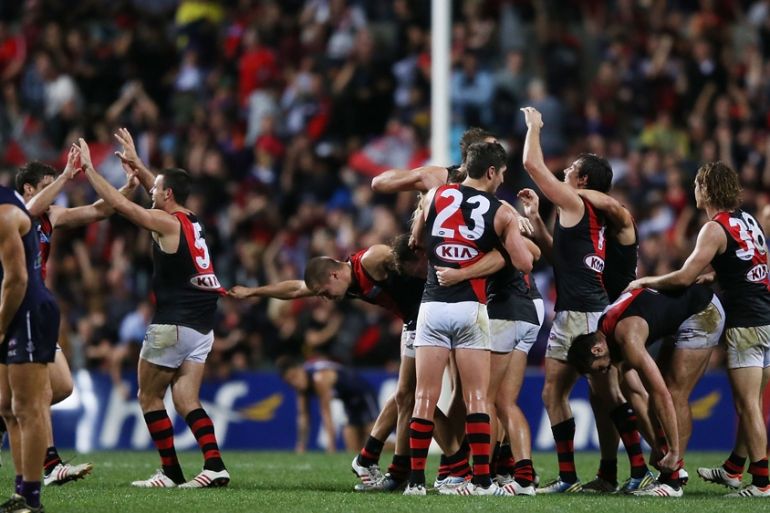Australian football team floored by mass doping bans
Thirty-four past and present Essendon Australian rules football players banned in Court of Arbitration for Sport ruling.

Thirty-four past and present players from the Essendon Bombers professional Australian Rules football team, one of the country’s richest football clubs, have been issued with two-year bans for doping in a ruling that stunned the sports-mad nation.
The Court of Arbitration for Sport (CAS) upheld an appeal brought by the World Anti-Doping Agency against a decision in March which cleared the players of taking a banned supplement during the Australian Football League’s 2012 championship season.
Keep reading
list of 4 itemsWhat to know about Chinese Olympic swimmers’ doping scandal
Kiptum remembered in Kenya’s London marathon double
OJ Simpson dies after battle with cancer
“The 34 players concerned are sanctioned with a period of ineligibility of two years, commencing on March 31, 2015, with credit given for any individual period of ineligibility already served,” CAS said in a statement.
|
|
“Thus, most of the suspensions will come to an end in November 2016.”
The decision leaves Melbourne-based Essendon without 12 of their listed players and effectively hobbled for the entire 2016 season of AFL, a game supported religiously in the nation’s southern states.
Five of the 34 play for four other clubs, with the remaining 17 are no longer active in the 18-team top-flight.
In Australia’s biggest doping scandal in domestic sport, Essendon were heavily sanctioned by the AFL in 2013 after a joint investigation with the country’s national anti-doping authority uncovered an organised and highly dubious regime of supplement injections given to players.
The club, whose local standing can be likened to the Green Bay Packers in American football or Manchester United in British football, were fined $1.4m, kicked out of the 2013 play-offs and had their coach, James Hird, suspended for a year for bringing the game into disrepute.
But last March, the AFL’s anti-doping tribunal found the players not guilty of taking Thymosin beta-4, a banned supplement believed to aid in tissue repair and regeneration, citing a lack of evidence.
Essendon released a statement on Tuesday, saying the CAS ruling was “incredibly disappointing”.
AL JAZEERA INVESTIGATION: The dark side – The secret world of sports doping
“This finding is heartbreaking for our players, who will struggle to understand how two tribunals could come to such different conclusions based on the same evidence,” Essendon Chairman Lindsay Tanner said.
“We felt that the comprehensive verdict of the Anti-Doping Tribunal last year was the correct one.
“Notwithstanding that, we acknowledge the authority of the Court of Arbitration for Sport and we must accept its decision.
“As a Club, we should have had more robust systems in place to ensure the protection of our players.”